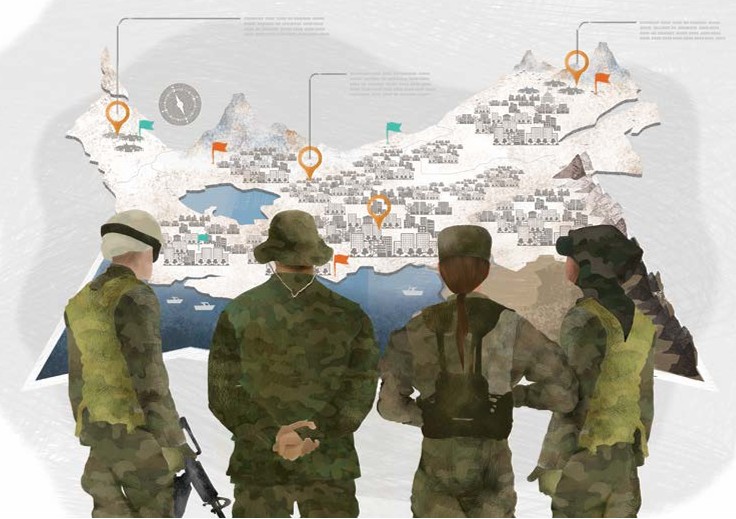***
This blog post is a reply to Hugo Slim’s recent post on Impartiality and Intersectionality. We foreground the concepts of vulnerability and epistemic injustice and raise questions about the ethical implications of the ways in which these concepts are operationalized in humanitarian practice. Among other worries, we wonder about its potential to perpetuate injustices, even as its use aims at ameliorating them. For example, bracketing identities into categories of vulnerability can result in absolute reductionisms. Individuals who experienced gender-based violence may, for instance, be viewed as passive victims and humanitarian health responses may forego positive coping strategies.Epistemic injustice, in this case refers to the silencing, albeit unintentional, of voices and limitations within narratives that are represented in research and practice. We connect epistemic injustice with Slim’s work from the point of view that intersectionality is bound with defined vulnerabilities existing within paradigms of injustice, both structural and epistemic.
Hugo Slim rightly calls for investigating the real-world implications of the ethical ideals and concepts that guide humanitarian action. His analysis of the tensions raised by the commitment to universal principles such as impartiality, and the recognition that such principles can ignore or obscure morally relevant differences among people, helps advance thinking about how to improve responsiveness. Highlighting intersectional theory, Slim underscores the need to resist reducing real people to simplistic categorizations (males, females, white people, black people, disabled people, and so on) and instead appreciate the ‘complexity of human identity and power relations’ that make everyone’s experience distinct and individual, even though we are socially enmeshed, interdependent creatures.
In our response, we draw on the work of our research cluster which foregrounds vulnerability in humanitarian interventions using a framework of epistemic injustice, which offers a nuanced understanding of social structural injustice. Vulnerability has been defined as a situation in which someone is at increased likelihood of being harmed and/or not having her interests justly considered. It is also a situation where she is weakened in her capacity to protect her own interests. This core ethical concept in humanitarian action (and more broadly in bioethics and research ethics) aims to help moral agents fine-tune their efforts to uphold the equal moral worth of all people by paying better attention to individuality. But it is worth asking—just as critics of the way ‘vulnerability’ is used in research ethics have (Levine et al, 2004)—whether humanitarian policy and practice understands and operationalizes the concepts of vulnerability/vulnerable groups in ways that are reductionist, risk stereotyping, and both over- and under-inclusive.
Contemporary understandings of disasters—including conflict and man-made crises stemming from natural disasters—see these events as living embodiments of social processes (Quarantelli, 1999). Who is most affected by the crisis (the identities of those affected) is directly related to the way individuals are differentiated in times of peace or non-disaster. The health of individuals during a humanitarian response is therefore determined by socio-political factors that existed prior to the disaster (Chung, 2012). Indeed, Chung and Hunt (2012) have noted the need to recognize—and reckon with—the ways in which structural injustice creates and potentially perpetuates vulnerabilities in the context of disaster and humanitarian response. The concept of intersectionality is directly relevant to understanding how sufferers are perceived through a humanitarian lens. When suffering is matched with vulnerability then there is no space for agency, positive coping strategies or activism and we see the generalization or imposition, as Slim alludes to, of ‘single types of humanitarian identity on people’.
Humanitarian emergencies unfold as such because of background conditions of social injustice. In these contexts—for example in conflicts shaped by the ‘new wars’ framework of Kaldor and Chinkin (2013) that are protracted, involving intra-State armed groups, and characterized by gender-based violence—identities are shaped by the social processes inherent in the crisis. Intersectionality’s great ability, as Slim points out, lies in showing the variety of factors, identities and experiences that shape the lives of individuals. The normative importance of our ‘experience of power’ can be further unpacked via the idea that structural injustice occurs when (otherwise legitimate) social structures and processes operate so that certain individuals and groups are systematically oppressed, marginalized or otherwise subject to suffering, while those very same structures and processes enable others to flourish (Allan, 2014). Awareness not only of how individuals and groups might be situated within such structures and process (to a great extent because of their intersectional identities), but also of how crises exacerbate these oppressive structures and processes and how the humanitarian action itself might inadvertently reinforce such injustices, is crucial to providing an appropriate humanitarian response. If humanitarian health actors fail to attend to the social, political, and economic determinants of health and health inequity when they assist populations in crisis, and if they think only in terms of how, for example, disaster makes women or disabled people more vulnerable, they may well fail to address real and enduring needs and may, moreover, unintentionally contribute to global inequities.
Our research on epistemic injustice
Epistemologies of vulnerability describe ways of forming knowledge about groups characterized as vulnerable and suggest that these ways need to be scrutinized and, perhaps, challenged. The research our team is developing asks whether epistemic injustice plays a role in how the concepts of vulnerability and vulnerable populations are understood and operationalized in humanitarian policy and action. These concepts come up in such contexts as resource allocation and the design of interventions. When international humanitarian organizations and humanitarian health workers identify populations and individuals as vulnerable, are others that are also at elevated risk of harm overlooked? Are ‘vulnerable populations’ and others at elevated risk of harm subject to credibility deficits. That is, are they disregarded or dismissed as holders and providers of valid knowledge? If so, are International Humanitarian Organizations (IHOs) aware of this and working to address it? Do constructions of ‘vulnerability’ threaten the moral agency and identity of recipients and perpetuate notions of otherness and/or damaging stereotypes? Do such constructions, focusing on individuals and population groups, obscure background conditions of injustice and so compromise the just allocation of resources, inhibit patient care, and more broadly undermine humanitarian responsiveness? How does structural injustice contribute to epistemic injustice, and vice versa?
Humanitarian organizations aim to respect the equal moral worth of all people and have come to use vulnerability as a sort of flag for giving heightened ethical attention with the aim of promoting justice. It is therefore vitally important to identify—and ideally find ways to rectify—any principles and practices that unintentionally deepen rather than dismantle injustice.
***
Acknowledgements to: Dr Verina Wild (Ludwig-Maximilians-University of Munich), Professor Lisa Schwartz (McMaster University) and Dr Yashar Saghai (Johns Hopkins Berman Institute of Bioethics)
Funding Collaboration: Wellcome Seed Award in Humanities and Social Sciences





May I add a question to the above reaction:
How far have the “vulnerable populations” been involved in this (and other) analysis? Did they have any opportunity to express themselves, to describe the way their suffering was affecting their immediate future and how to cope with it? At the end of the day, they are the ones who know better.
Let’s stop looking at these people as if they were just a topic of interest for academic studies. They do exist by themselves, whatever the circumstances.
Quite an interesting discussion and it raises many interesting and fascinating questions. As a layman humanitarian trying to respond to the needs of those affected by conflict and violence, I join Mercier to ask the question: what do the persons subject of the discussion think of it all? In addition, how can we as humanitarians concretely ensure that we uphold our ethics with the need to plan ahead what we would like to achieve through the lenses of what we identify as potentially vulnerable categories of persons? Reading the reaction above, the answer to my question might be: define the response only after meeting the individual (not the community/category) concerned and assessing with them their vulnerabilities and needs to avoid biased categorization and definition of vulnerabilities. If that is the right answer it raises yet another question. How one can reconcile that objective with the need to plan ahead and be accountable for achieving or not achieving the planned objectives?
Speaking as a member of a ‘group characterised as vulnerable’ – a rather clumsy new circumlocution -isn’t there a problem that by your analysis, humanitarian actors are damned if they do, damned if they don’t? For a long time, our efforts have been to get these actors to recognise that, for example,disabled people have higher mortality and morbidity in emergency situations (which often are natural disasters like Fukushima or Haiti earthquake, neither of which were caused by social inequality). Now you are criticising these actors for unwittingly assuming that disabled people and other groups are always vulnerable or victims. The human rights based approach, which most actors at least formally adopt, explicitly states that promoting the voice of people is core to achieving rights. Yes, it’s all complicated. But the whole point of urgent crises and emergencies is that you need a simple rubric – the complexities, intersectionalities and subtleties are likely to be lost because people are dying.